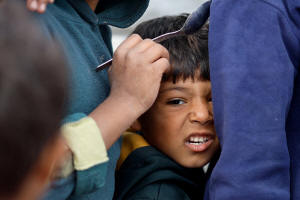|
Israel's offensive launched in the wake of a deadly rampage by
Hamas militants in southern Israel on Oct. 7 has displaced most
of Gaza's 2.3 million population and caused acute shortages of
food, water and medical supplies.
At least 25,295 people in Gaza have been killed, according to
Palestinian authorities, with thousands more feared buried under
the rubble of a coastal strip largely laid to waste.
"It's difficult to get into the places where we need to get to
in Gaza, especially in northern Gaza," said Abeer Etefa, WFP
spokesperson for the Middle East.
"Very little assistance has made it beyond the southern part of
the Gaza Strip... I think the risk of having pockets of famine
in Gaza is very much still there."
Etefa noted that there was a "systematic limitation on getting
into the north of Gaza, not just for the WFP".
"This is why we're seeing people becoming more desperate and
being impatient to wait for food distributions, because it's
very sporadic," she said.
"They don't get it frequently, and they have no trust or
confidence that these convoys will come again."
The U.N. humanitarian office this month said Israeli authorities
were systematically denying it access to northern Gaza to
deliver aid and this had significantly hindered the humanitarian
operation there.
Israel has previously denied blocking the entry of aid.
Since the start of hostilities, aid deliveries to northern Gaza
have been limited, and the area was cut off altogether from
external aid for weeks earlier in the conflict.
(Reporting by Gabrielle Tétrault-Farber; Editing by Miranda
Murray and Nick Macfie)
[© 2024 Thomson Reuters. All rights
reserved.]
Copyright 2022 Reuters. All rights reserved. This material may
not be published, broadcast, rewritten or redistributed.
Thompson Reuters is solely responsible for this content.

|
|




